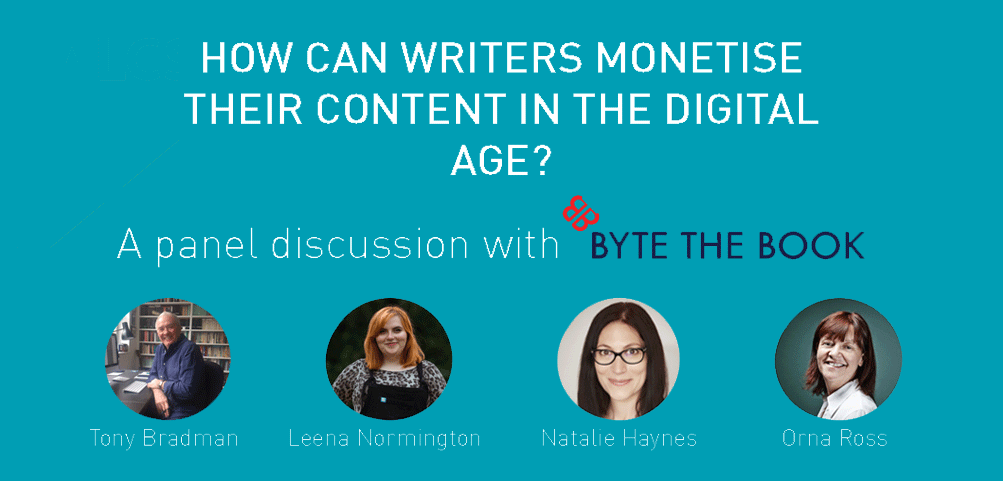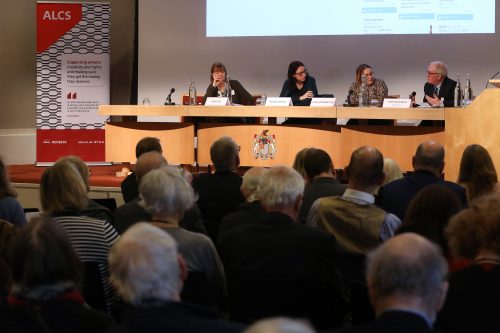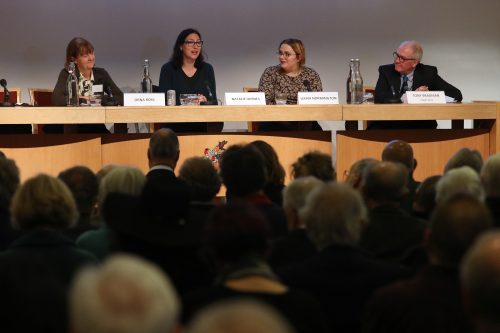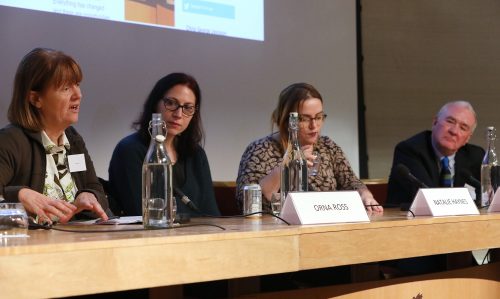
HOW CAN WRITERS MONETISE THEIR CONTENT IN THE DIGITAL AGE? AN ALCS PANEL DISCUSSION
This year’s ALCS AGM was prefaced by a fascinating panel discussion held in association with Byte the Book.
Tony Bradman, children’s writer and chair of ALCS chaired the discussion and introduced the three panellists:
Leena Normington (@leenanorms), a producer and online creator who has amassed over four million views on her book-themed YouTube channel and launched a chart-stopping podcast entitled, ‘I’m Not Being Funny But’. Currently Social Media Producer for Vintage at Penguin Random House, she has collaborated with the European Commission, the US Embassy in London, the Man Booker Prize, Vice and BBC3.
Natalie Haynes, a writer and broadcaster, whose first novel The Amber Fury was published to great acclaim on both sides of the Atlantic. Her retelling of the Trojan War A Thousand Ships will be published in May 2019. She writes for The Guardian, is a regular contributor to BBC Radio 4, and has judged both the Orange Prize for Fiction and the Man Booker Prize.
Orna Ross (@OrnaRoss), an award-winning and bestselling independent author who writes novels, poems, and non-fiction for other indie authors and creative entrepreneurs. A facilitator and advocate for self-publishing and digital micro-business for creatives, she is also Founder-Director of the Alliance of Independent Authors (ALLi) and has several times been named “one of the 100 most influential people in publishing” by The Bookseller.
Tony Bradman began by saying that an alternative, and perhaps simpler, title for the discussion might be: how do we make enough money from our work so that we can keep on writing? He invited each panellist in turn to give their personal response to that question.
Leena Normington began by addressing the role that social media can play in providing writers with a platform for their work. Firstly, rather than feeling you have to copy others, she said it was important to find a channel you yourself feel comfortable with, and put your efforts into that (author Kate Morton, for example, is solely on Instagram). When considering their profile on social media, writers need to be authentic, and have a specific USP which will draw people in. Newsletters, she said can also be extremely effective.
 Natalie Haynes said that the bulk of her income comes from talking, something that can be quite hard for writers to do, given that writing is a mainly solitary job. She is regularly asked to work for nothing or for very little money, even by the BBC which routinely underpays women, she said. By appealing against a low fee, she has often increased the amount offered by 10%. “I am no longer prepared to be nice about these things,” she declared.
Natalie Haynes said that the bulk of her income comes from talking, something that can be quite hard for writers to do, given that writing is a mainly solitary job. She is regularly asked to work for nothing or for very little money, even by the BBC which routinely underpays women, she said. By appealing against a low fee, she has often increased the amount offered by 10%. “I am no longer prepared to be nice about these things,” she declared.
Orna Ross began by paying tribute to organisations like ALCS which defends the copyright laws that protect authors. There are lots of opportunities to make money, she said, but authors need to adopt a certain kind of mindset in order to benefit from them. Now that there are so many ways in which writers can go direct to their readers, we should think of ourselves as business people, or perhaps as creative entrepreneurs. ALLi has launched its Self-Publishing 3.0 programme to reflect the fact that the possibilities of independently publishing one’s work have now gone beyond just what Amazon has to offer. There are also huge opportunities opening up for writers through audio publishing, Orna added.
Tony Bradman said that the problem many authors have with thinking of themselves as business people is that they worry their lives will be dominated by the business of being an author, rather than by actually writing. Was it really that easy?
Natalie Haynes said that while most of us don’t start out being good at negotiating, her time as a stand-up comedian had helped her be very open about money. It is important for writers to stand up for the principle of being paid, she said, and to support their fellow writers in doing so. Tony Bradman suggested that this principle should also extend to publishers who are also very opaque about who is being paid what.
Orna Ross said that business models are changing in favour of writers, with new digital tools now available to help us sell our work directly to readers online. Selling direct, she said, allows writers to convey more effectively to readers the passion for a subject that makes us want to write in the first place. She encouraged writers in the audience not to be afraid of “being in business. It’s not about old-fashioned hustling anymore”. Furthermore, she encouraged everyone to try self-publishing a book at least once, if only to gain more understanding about the processes involved in any type of publishing.
Tony Bradman then asked Leena Normington to suggest the best ways of incorporating social media into your writing life. She responded that it was a question of how much time you are willing to give the platform in question. In her view, Twitter was useful for having conversations, although posts have a much shorter shelf life on timelines, as opposed to on Instagram where they can stay in people’s timelines.
Is it still worth authors having a website? Natalie Haynes responded that for her, it absolutely is, even at the most basic level of referring people to it for simple and commonly requested downloads such as her biog and author photo. Orna Ross agreed, saying “yes, absolutely”. Every author should have a website that you can update and control yourself, she argued. And ideally it should also be a functioning e-commerce website so that authors can offer direct sales of their books.
At the end of the hour, Tony thanked all the panellists for their insights, and to Byte the Book for their help in staging the event. All were warmly applauded.
The full panel discussion can be viewed here.
All the photos from this event can be found on the ALCS Facebook page.
Report by Caroline Sanderson, author, freelance books journalist and editor of ALCS News.
Photographs © Richard Lewis
 Byte the Book
Byte the Book
Byte the Book is a network that helps writers make useful connections within the book industry, and other allied industries, and enables them to become more literate in the business of books. The community is focused on learning about the latest technical and commercial opportunities, and collaborating to maximum benefit.
